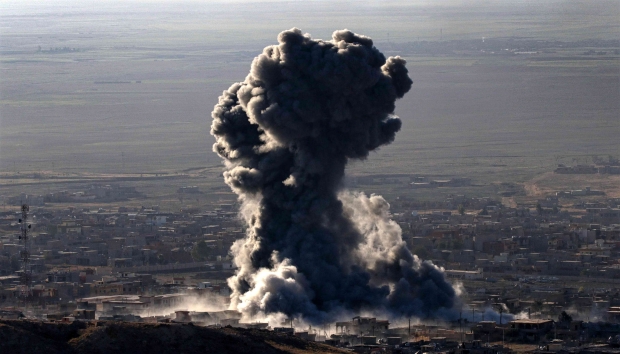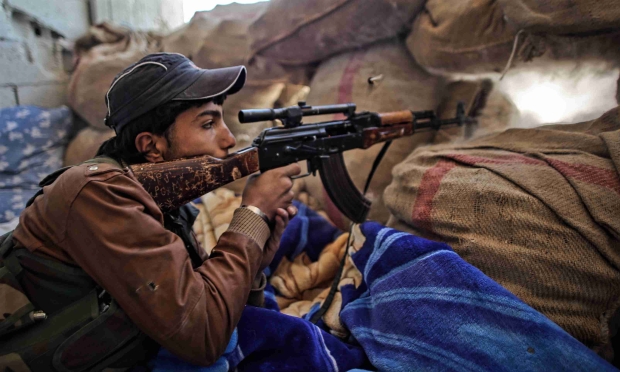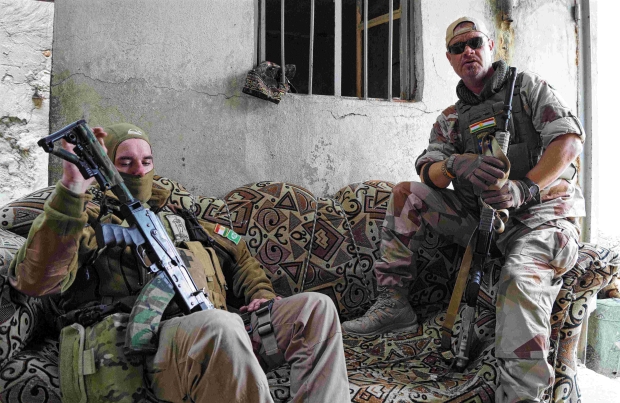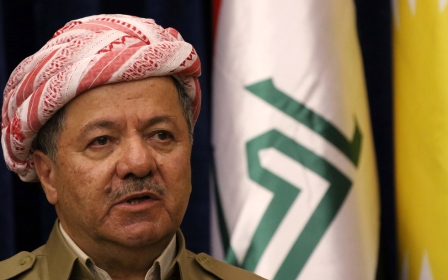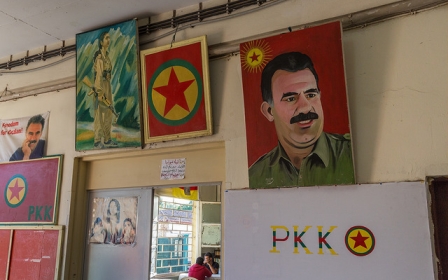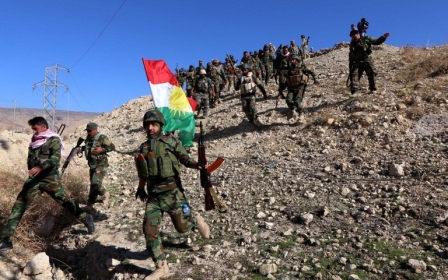War in Syria: How foreign fighters got caught up in Kurdish clash
When Tony Ekman, a Swedish volunteer, signed up to fight alongside Kurdish forces against Islamic State (IS) in Iraqi Kurdistan, he never thought he would one day be asked to battle against former comrades.
Ekman joined the Peshmerga forces affiliated to the Patriotic Union of Kurdistan (PUK) in 2015 and participated in the liberation of Sinjar in November 2015. There, Ekman told MEE, he wanted to join the fight for the adrenaline rush, to get as close to the action as possible.
'I was never kidnapped by the YBS,' said Eckman. 'I was never kidnapped by anybody'
But then he briefly joined the Sinjar Resistance Units (YBS) and got caught up in intra-Kurdish conflict on 3 March between his current group - set up in August 2014 and affiliated to the Kurdistan Workers Party (PKK) - and the Kurdistan Democratic Party (KDP), which is led by Massoud Barzani, president of the Kurdistan Regional Government.
Ekman refused to fight, became stranded in Sinjar and was – according to some reports - put under house arrest.
“I called my brother, and told him I have difficulties, and he told the newspapers,” Ekman said (his story eventually made the media in his native Sweden).
“But I was never kidnapped by the YBS,” he said. “I was never kidnapped by anybody.”
Rizgar Derik is the pseudonym of an international volunteer who served with the People’s Protection Units (YPG) in Syria until 10 months ago. He is now with the YBS and previously helped Tony with translating.
“He was never arrested, he has just been trying to leave. But the hevals [YBS commanders] have been waiting to safely arrange it.
“He wanted to walk away at night to Peshmerga lines with his weapon wearing civilian clothes. But that just isn’t an option.”
Tensions increase between Kurds
There have always been tensions between armed Kurdish groups – but these have been exacerbated during the current conflict against IS in Syria and Iraq.
One of the most notable rivalries has been between the Kurdistan Democratic Party (KDP) and the Kurdistan Workers Party (PKK), over territory and control in Sinjar, as well as Syria.
It wasn’t always so. When IS initially attacked Kurdistan in August 2014 there was a brief period of cooperation. Massoud Barzani visited the PKK that month to thank them for their defence of Iraqi Kurdistan; and in November 2014 , Kurdish Peshmerga fighters arrived in the Syrian town of Kobane, to help the People’s Protection Units (YPG), which are backed by the PKK.
But now IS is losing territory - and without a common enemy, tensions between affiliates of the KDP and PKK are rising to the fore.
The US consulate in Erbil has tried to ease the PKK influence in Sinjar, and negotiate between the different groups. Washington fears that the PKK presence could complicate reconstruction and invite an armed Turkish response, either by air or land.
"We understand some of the tensions on the ground with respect to, for example, the PKK, that we believe has no place on the battlefield and we consider to be a foreign terrorist organisation," Mark Toner, the US State Department spokesperson said on 13 March after the clashes.
The US consul and a delegation visited leaders of the YBS, PUK and KDP in Sinjar in December last year. There were also negotiations between the KDP and the PKK in January.
'We understand some of the tensions on the ground with respect to, for example, the PKK, that we believe has no place on the battlefield and we consider to be a foreign terrorist organization'
- Mark Toner, US State Department spokesperson
But any chance at peace was wrecked by the clashes on 3 March, when the KDP send a large number of Syrian Kurdish fighters - also known as the Rojava Peshmergas - to Sinjar. Their goal was to control the Syrian border – but this was unacceptable to the YBS, which halted them in the town of Khanasor
In the subsequent clash, seven PKK fighters were killed. Nujiyan Erhan, a Kurdish journalist, later died from her injuries. On 14 March, one civilian was killed and at least seven wounded in a pro-PKK protest in Sinjar when KDP security forces opened fire, Human Rights Watch said.
And KDP-affiliated security forces and police detained 32 pro-PKK protesters in Erbil at a peaceful demonstration on 4 March about the Sinjar clashes. Six foreign nationals are still being held.
Sinjar clashes spark civil war fears
The clashes have also caused tension elsewhere in the region.
The YPG has been the dominant force in the north of Syria since July 2012. Pro-Barzani groups, which were also part of the Syrian opposition, were marginalised and faced arrest for refusing to recognise the administration set up by the Democratic Union Party (PYD), which is affiliated to the YPG and PKK.
A power-share deal between KDP-backed and PKK-backed Syrian Kurdish parties in northern Syria, planned from October 2014 onwards, never happened. Instead both the KDP- and the PYD-affiliated security forces cracked down on their rivals.
Following the clashes in Sinjar on 3 March, security forces in northern Syria detained more than 40 members of the Kurdish National Council (KNC), a party affiliated with Barzani, Human Rights Watch said. Moreover, several offices of the KNC were burned after the clashes in Sinjar. Pro-Barzani politicians continue to be arrested after the clashes.
'I highly doubt that any foreign volunteers would be willing to take part in an intra-Kurdish conflict rather than fighting ISIS'
- Ceng Sagnic, researcher
The YPG did not want KDP-affiliated Syrian Rojava Peshmerga forces to return to Syria, claiming that the existence of two Kurdish military forces could lead to a civil war.
The tensions also have a regional dimensions. The PKK has blamed Turkey for pushing Barzani against the YBS in Sinjar. Meanwhile the KDP has blamed Iran for using the PKK to open a corridor to Syria.
As a result of the intra-Kurdish tensions, and PYD-affiliated security forces arresting pro-Barzani politicians, the KRG has become tougher on foreign volunteers during the past year and tightened border control in order to pressure the PYD.
Crackdown on foreigners
The KDP-affiliated Rudaw news website says that foreigners (volunteers) face up to one month jail time for illegally crossing the border in Kurdistan. They may also be fined up to $1,000 per month for expired visas.
“I highly doubt that any foreign volunteers would be willing to take part in an intra-Kurdish conflict rather than fighting ISIS,” Ceng Sagnic, a researcher with the Tel Aviv-based Moshe Dayan Center for Middle Eastern and African Studies told ARA news.
“All foreign volunteers who want to join YPG are required to use KRG territory to access Syria, and exit if they want to,” he added.
Joe Akerman, a former YPG volunteer from the UK, was jailed in Erbil for 10 days after he returned from Syria.
Akerman said that most of them had visas which were six months out of date. “It hasn’t been like that from the beginning that [YPG] volunteers get into trouble with the KDP. In the beginning it was all cool,” he said.
Stresses of being a volunteer
Other foreigners, fighting with various Kurdish sides in the conflict, are sympathetic towards Ekman’s plight.
Canadian Jason Troy, 39, one of the few volunteers who was with Ekman in Sinjar in November 2015, told Middle East Eye that it looked like his friend was caught between forces loyal to Barzani and the YBS.
'The biggest stress factor as a volunteer, for me at least, was doing something very stupid that would bring shame on to your home country and or land you in serious criminal jeopardy'
- Jason Troy, volunteer fighter
“As volunteers we came to fight foreign Daesh terrorists, not Kurds or any other ethnic or religious minority,” he told MEE. “It seems like Tony ended up in a safe house somewhere to let the tensions cool down, was probably bored and no one was telling him anything and maybe became frustrated,” he said.
He said that Ekman had made the right decision to not get embroiled. “I can relate. There are immense stresses involved in volunteering with Peshmerga or Kurdish resistance factions. From lack of material support and supply, to no monetary funding, getting killed or worse, injured with no benefits.
"But the biggest stress factor as a volunteer, for me at least, was doing something very stupid that would bring shame on to your home country and or land you in serious criminal jeopardy."
After the story broke out that Ekman was stuck in Sinjar, negotiations took place between PUK commanders, Kurdish officials and the YBS.
On 30 March Ekman was handed over to the Peshmerga forces, he told MEE by phone. Most likely he will return to Sweden. “I want to take a break, I am just tired,” he said.
But the tensions and the power struggle between the KDP and the PKK look set to continue.
New MEE newsletter: Jerusalem Dispatch
Sign up to get the latest insights and analysis on Israel-Palestine, alongside Turkey Unpacked and other MEE newsletters
Middle East Eye delivers independent and unrivalled coverage and analysis of the Middle East, North Africa and beyond. To learn more about republishing this content and the associated fees, please fill out this form. More about MEE can be found here.


